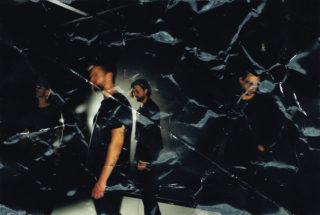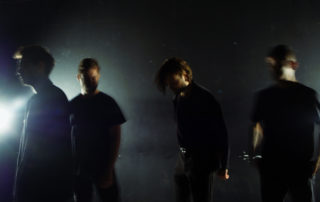SCALPING – An EBM band inspired by Bristol soundsystems plays with improvisation and obscene imagery
To create a place where you can lose yourself in the chaos

To create a place where you can lose yourself in the chaos
Amongst Bristol’s vital avant-garde scene there is a current impulse to reconcile aspects of the city’s soundsystem culture with the theatrical, performed nature of live guitar music. With the most famous example being Giant Swan, who create industrial techno using guitar pedals and looped vocals, this has produced an extraordinary new wave of genre-traversing projects.
The latest of these is SCALPING: an audio-visual EBM group who – through the medium of a semi-traditional guitar band – create muscular, cerebral techno drawing from punk, post-rock and industrial music. Comprising James Rushforth (bass), Isaac Jones (drums), Jamie Thomas (guitar) and Alex Hill (electronics), the band has risen to attention principally through their stunning, heavily-improvised performances; these employ a large projection screen, on which visual artist Jason Baker throws striking live animations replete with grotesques, sci-fi imagery and shock-humour.
Since stumbling upon their first gig, I have been convinced of SCALPING’s destiny as the city’s next breakthrough act, appropriating them as standard-bearers for my publication The Bristol Germ and holding some of their first shows. This year I was proved right, with tours around their debut EP CHAMBER (out on Council Records) making them one of 2019’s hottest new bands. I reunited with the group in Bristol to reflect on how this remarkable project came into being.
Part of the impetus, Rushforth explains, was “a frustration with seeing non-live elements in a lot of electronic music”. Sharing backgrounds in guitar projects, the members’ exposure to Bristol’s electronic scene inspired them to “find ways of reverse-engineering those sounds, and applying them to a band”.
“It’s a marriage of the things we enjoy most about both worlds,” Thomas adds. Rather than trade in the instruments they had learned in order to pursue electronic music, it proved “more interesting to adapt what we already know”.
“What’s weird,” Baker remarks, “is everything that’s brilliant about this seems obvious in hindsight.” The spectacle of dance music with live drums is, in itself, undeniable.

Playing to a click in Jones’ ear, SCALPING perform entirely live and without breaks, to a gradually increasing tempo. Initially requiring a laptop to play tracks, this was quickly removed by Hill in favour of a more hands-on electronic setup. He says his desire to “create on the fly” was partially spurred by his research into post-war experimental music, consolidated in his remarkable record Ces Expériences. “Having stuff at your fingertips makes it a lot more reactive and chaotic live,” he says.
The sets have duly become increasingly improvisational. Having played 22 festivals this summer (with no time for dedicated practices), this has emerged from simply trying things out at shows; Rushforth describes the unwitting development of a “rota of sounds” amongst them, organically taking turns to push their individual elements.
The ultimate goal of SCALPING as an instrumental project, they claim, is total escapism. Thomas points to his favourite band Sunn O))) as an example of this, “where you lose yourself in something meditative, or chaotic”.
Where conventional bands might rely on lyrics to imbue the music with subject-matter, in SCALPING this role is fulfilled by Baker’s staggering visuals. These make their way into the sets based on how strong a reaction they elicit from the members, and point to an eccentric sense of humour: a recurring figure is a gelatinous, technicoloured humanoid, who is variously shown dancing obscenely, changing shape, dropping from the sky and vomiting entrails. “You can have grotesque stuff,” Baker says, “but if you light it with bright primary colours there’s an immediate juxtaposition there.”
“We always joke that it’s like watching fireworks,” Hill says, claiming the visuals help engage people who might not immediately appreciate “banging live techno”.
Baker was recruited to the project after Rushforth saw one of his AV performances with the excellent Kayla Painter. When I ask how working with SCALPING differs from creating visuals for other projects, Baker claims he is allowed to “push things” as far as he wants. “It’s all about how I can elicit an extreme reaction from people in that moment, be it disgust or a sense of losing your mind”.
Earlier this year, SCALPING faced the challenge of how to bring this all into the studio for the CHAMBER EP. This featured two tracks and remixes by Bristol producers Bruce and DJ October, a figure Rushforth claims to have always looked up to, as having masterfully married industrial guitar music with EDM. To the band’s genuine surprise, the EP received an excellent response, even gaining a mainstream radio supporter in Huw Stephens. “It’s not the kind of music you expect to be played on daytime 6Music – at all,” Hill says.
“What’s even more insane, is playing shows and people tell you they’ve come because they heard you on radio,” Rushforth adds. “That seems like such an archaic way of ingesting information, let alone following it up and going to see it live.”
“It’s nice though,” Thomas considers, “that this more traditional, ‘punk-rock’ way of following music has managed to transpose itself onto what we’re doing… what we’re trying to do is bridge that gap.”
Equally, Jones notes its acceptance by the EDM community, being played at techno nights including a recent Boiler Room. “We never knew if it was actually going to work that way,” he says, “but it’s what we were trying to achieve – that it could sit in both worlds.”
“It shouldn’t be a strange thing for a guitar to come up on a dance-floor,” Rushforth adds. “It’s just another way of making a sound.”
This set of aspirations is something SCALPING attribute foremost to Bristol. “The city’s music has shaped this project more than anything,” Hill claims. “I don’t think there’s any other place where it would have happened quite this way.”
Thomas supports this, noting local artists’ disregard for ‘looking cool’, while Rushforth points to the quality of Bristol’s soundsystems in shaping an understanding of great electronic music: “Just being able to experience proper bass is a privilege a lot of people don’t have,” he says.
“Bristol gives you a confidence to not hold back when you do have ideas,” Jones adds. “You end up doing quite unusual things not because of a deliberate plan, but because there’s nothing to hold you back. There’s a collective confidence because everyone is being uncompromising”.
Accordingly, the group’s new single, ‘Ruptured’, is a far darker, more left-field track than those on CHAMBER; “it just gives a more rounded view of what we do,” Rushforth claims. “That first one had to be a banger… this one shows we can play slower and make it a bit more production-focused.”
“I don’t know how people are going to react to it,” Hill says. “This one might require a bit more patience.”
“That’s alright” Rushforth replies, “got to separate the wheat from the chaff somehow.”
Beyond this, the group are uncertain as to where SCALPING goes next. “We never decided for ourselves what we’re going to end up being,” Jones claims. “We’re in an environment where it can grow into anything.”
For now, the focus is to “constantly be nodding to both worlds,” Rushforth says. “To see bands and dance music, keeping up to date with both sides, while still trying to be SCALPING… outside of everything.”
Photos by: Mariana Sabio